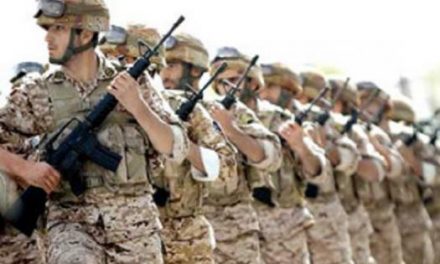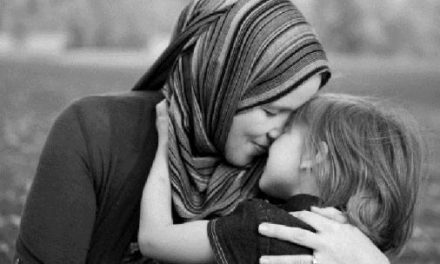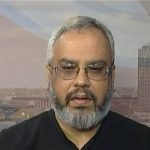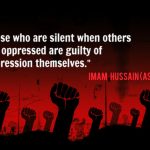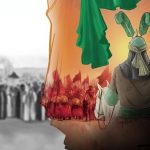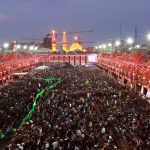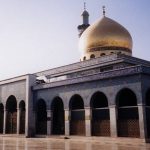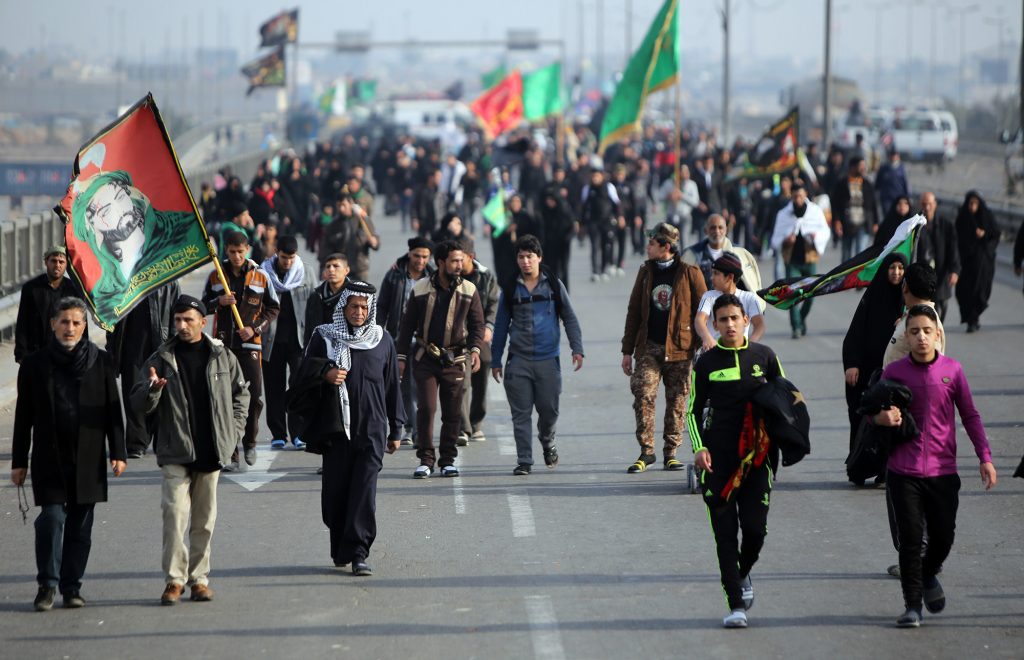
By Dr. Chris Hewer
When thinking of Imam Husayn, we need to remember his position in the great world order. There is only one God, one human family, and therefore one human project, which is to live this life to the full in obedience to God’s guidance and thus to be admitted to Paradise in the life to come. The key element here is God’s guidance. God is just and therefore the guidance must be in essence the same in all generations and places. Anything that expresses that guidance or anyone who demonstrates God’s guidance is therefore an example to all humankind throughout all ages. This points to the importance of Husayn ibn Ali.
The Qur’an calls itself guidance for all humankind. The Prophet Muhammad is a blessing for all the worlds. In Shia understanding, the Imams appointed by God for the guidance of the community after the death of the Prophet are also protected from sin and error. This means that the divinely-appointed Husayn is a divinely-inspired role model or exemplar for all humankind. Husayn, his life, his actions, his death, belongs to all humankind. All human beings can learn from his example.
One of the Hadith attributed to the Prophet says, “The greatest jihad is to speak the word of truth into the face of the tyrant”. This is the dominant message that we should take from Imam Husayn. He was put into a situation in which the eyes of the community would look to him for an example: Would he give in and make an oath of allegiance to the tyrant Yazid? Tyranny exists in every age. Some tyrants use armies and brute force, or economic power, or lies and distortions of the truth to apply pressure on people. Should one give in or “speak the word of truth” following the example of Imam Husayn?
In an age in which the shedding of the blood of innocent people, and indeed of ‘the enemy’, is cheap we need to take another lesson from Imam Husayn. The Prophet made a treaty with the Makkans at Hudaibiyya to avoid bloodshed. Imam Ali commanded no reprisals against the community of his assassin. In the same way, Imam Husayn moves from Madina so that the city of the Prophet will not be the site of conflict with the agents of Yazid. Again, he left Makka on the Day of Arafat rather than have the city of God awash with innocent blood. Even on the night before Ashura, he gave the freedom to his companions to save themselves and leave under cover of darkness: “It’s me that they want. Leave when I blow out the candle.” But we know that they stayed and preferred to die with their Imam rather than desert him. This desire to spare human life and to regard every human life as of infinite value screams out as a lesson from the Imam to a world that turns its back on refugees, denies the dignity of displaced people, and regards innocent human beings as ‘collateral damage’.
“Words are cheap” we say. God demands faith expressed in actions and not just in words. Believing in God is not enough; Iblis, the Shaytan, believes in God’s existence! What God demands is faith expressed in actions; human beings are to obey God’s commands and observe God’s prohibitions. What we see in the example of Imam Husayn is a series of actions that demonstrate his complete faith and trust in God. Even to his last breath on the Field of Karbala. He goes out into the uncertainty of the desert with his family and companions trusting only that God will protect them. When news comes from Kufa that he will receive no welcome, he still goes on. When he is diverted from Kufa to Karbala by al-Hurr and his men, his faith is in God. When they are cut off from water and the air is filled with the cries of the children, when the odds seem impossible, when the final demand “pledge allegiance or die right here” is made, his faith is in God against all that would tempt him to give in. Right up to the last, seeing his family members and companions slaughtered before his eyes and about to face the same fate himself, his trust is in God that he will be vindicated. Centuries later, his example rings out to all humankind: stake everything of God, who will not desert you and can bring great victories from apparent failures.
As a divinely-inspired Imam, Husayn gives us an insight into the quality of God’s mercy. In their journey through the desert, Husayn and his companions were shadowed by al-Hurr and his men. Eventually al-Hurr would direct them to the Field of Karbala and their deaths. During the journey, it is recorded that al-Hurr and his men rode into the camp of Imam Husayn. They were dirty, weary and thirsty from many days in the heat and sand. Rather than rebuke them, the Imam ordered that men and horses should immediately be given that most precious commodity in the desert, water. This act of goodness and kindness touched the hearts of the men so that they lined up in ranks behind Husayn and joined the jamaat in prayer. It had a much more profound effect on al-Hurr and worked in his heart in the following days. On the Day of Ashura, he broke ranks and rode to the Imam to beg his forgiveness. Again, Husayn does not rebuke him. Rather, he is forgiven, raised up from the dirt and then given the highest of all honours, the crown of martyrdom; al-Hurr is allowed to die at the Imam’s side in the cause of right. Forgiveness does not leave one crippled but restores human dignity. Imam Husayn gives a profound insight into the infinite mercy of God, which is available to all those who repent and seek it.
Lifted up into eternity
Often, we speak of eternity as though it means ‘a very long time’. This is a mistake. Eternity means not being limited by time in any way, beyond the confines of time. When we say that ‘God is eternal’ we mean that God is beyond the constraints of time. Time is something created by God, who alone existed before anything was created. In this way, we can say that every event in human experience, what we call ‘the past, the present and the future’, is present to God beyond time, in eternity, ‘now’. Similarly, God is not limited by space, God is beyond the constraints of place. There is no ‘place’ that God is and there is no ‘place’ where God is not. So, God is beyond all time and space.
An event in human history, like the Day of Ashura and the Field of Karbala, is ‘here and now’ in the perspective of God. It has been lifted up into eternity and thus is constantly present. When we remember those events, we make them present in our lives, in our society, in our time. This is what the Shia mean when they say that “Every day is Ashura and every place is Karbala”. The struggle against injustice, the call to respect all human life, the demand for faith expressed in action and the invitation to express godly mercy are all current in every place and time. Every year, from the beginning of Muharram to the commemoration of Arbaeen, the followers of Imam Husayn are invited to pledge once again their devotion to follow his example and ‘make Karbala present in their hearts and lives’ right here and now. In terms of the annual cycle of ‘making present’, the events of Muharram rank amongst the most important in the Shia calendar. But they do not belong to the Shia and must not remain there. Part of ‘making present’ is to share their meaning and importance with all humankind to whom they rightly belong.
In the days leading up to Arbaeen, millions of Muslims from all over the world will be converging on Karbala. They will be supported along their journeys by those through whose communities they pass. They will be given food and water, places to sleep, requests for prayer, encouragement and wounded feet will be dressed. These actions by those who lend their support are examples of that ‘Karbala spirit’. Millions more around the world will join the pilgrims in thoughts and prayers. Is this just a ‘feel good’ event for those thus physically or spiritually taking part? Husayn and his companions did not give their lives so that their followers could ‘feel good’ and enjoy an uplifting experience. Those who understand the deeper meaning of these events have the duty to draw out examples from them and share them with their fellow human beings. In Britain, the campaign, “Who is Hussain?” has attempted to do this. People give water to relieve the thirst of travellers. Mosques organise blood donation sessions so that people might ‘shed their blood’ in a practical way to relieve human suffering. New ways are found to make elements of the message clear to another generation and in a culture far different from Iraq today.
All human actions have a political dimension. When giving water, one is asking why millions on earth today live without access to clean water and suffer the diseases that go with that. When feeding the hungry, one is asking how can it be that rich communities and nations allow hunger and famine to exist alongside the diseases of over-eating in other places. When sheltering the homeless, one asks why we tolerate a situation in which some have no roof over their heads whilst others have more than one home and palaces with many empty rooms. When we cry with those victims of various kinds of warfare and violence, those driven from their homes, those slaughtered like cockroaches by missiles, bombs and drones, we must ask who profits from these weapons of war, who stands in the shadows behind the attackers, and why the world watches on in silence while injustice and tyranny are allowed to prosper.
———
Dr. Chris Hewer comes from a background in Christian theology, education, Islamic studies and inter-faith studies and has worked in the field of Muslims in Britain and Christian-Muslim relations since 1986, first at the Centre for the Study of Islam and Christian-Muslim Relations at Selly Oak in Birmingham and from 1999 to 2005, as the Adviser on Inter-Faith Relations to the Bishop of Birmingham. From 2006-2010, he was the St Ethelburga Fellow in Christian-Muslim Relations in London, with a brief to deliver adult popular education courses, study days and talks around Greater London. His current work is to teach study days and residential courses, to develop written and electronic resources and to be available for consultation. His website is https://www.chrishewer.org/


